|
De Nederlandse dichter en schrijver Mark Boog werd geboren op 24 september 1970 in Utrecht. Zie ook mijn blog van 24 september 2009.xml:namespace prefix = o ns = "urn:schemas-microsoft-com:office:office" />
Liefde
De lucht ligt als een blok op het land,
onzichtbaar en massief.
Je gaat gekleed in de kleur van je haar,
in je ogen, je passen en je woorden.
Je bent hier en elders. Ik draag je me na
en huiver. Je bent te groot misschien,
of te dichtbij. Je onbereikbaarheid
is onvergeeflijk. Kon ik een vogel zijn
maar de nauwkeurigheid ontbreekt me
zoals het vertrouwen. Ik kijk naar je
en huiver. Spreek me aan, want ik zwijg,
verdraag mijn wurggreep, verdraag
de onbeholpenheid, verdraag mij, liefde.
Laat de avond vallen
Laat de avond vallen, ik,
en hou het huis heel stil zodat ik niet gestoord word -
zolang het schemert kan het misgaan.
De vogels zoeken langzaamaan hun takken op,
ik wijs ze die, en sterren tillen zich eruit omhoog.
Heel anders klinkt het razen van de auto's in de nacht!
Recht zo die gaat! Het ene zeil door het andere vervangen,
dag door nacht, maar nergens sluimert haperen, niets mokt.
Zolang het dit is wat ik doe gehoorzaamt men glimlachend.
Ik hoop maar dat er koffie is, of whisky, als ik
weer de kamer inkom, zeer vermoeid en door het uitblijven
van tegenstand- wat stribbelen zou al genoeg zijn -
vreemd ontmoedigd. Zó gestroomlijnd.
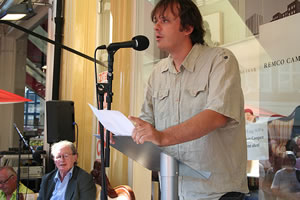
Mark Boog (Utrecht, 24 september 1970)
De Amerikaanse schrijver Francis Scott Fitzgerald werd geboren op 24 september 1896 in Saint Paul, in de staat Minnesota. Zie ook mijn blog van 24 september 2007 en ook mijn blog van 24 september 2006 en ook mijn blog van 24 september 2008 en ook mijn blog van 24 september 2009.
Uit: The Great Gatsby
My family have been prominent, well-to-do people in this middle-western city for three generations. The Carraways are something of a clan and we have a tradition that we're descended from the Dukes of Buccleuch, but the actual founder of my line was my grandfather's brother who came here in fifty-one, sent a substitute to the Civil War and started the wholesale hardware business that my father carries on today.
I never saw this great-uncle but I'm supposed to look like him -- with special reference to the rather hard-boiled painting that hangs in Father's office. I graduated from New Haven in 1915, just a quarter of a century after my father, and a little later I participated in that delayed Teutonic migration known as the Great War. I enjoyed the counter-raid so thoroughly that I came back restless. Instead of being the warm center of the world the middle-west now seemed like the ragged edge of the universe -- so I decided to go east and learn the bond business. Everybody I knew was in the bond business so I supposed it could support one more single man. All my aunts and uncles talked it over as if they were choosing a prep-school for me and finally said "Why -- ye-es" with very grave, hesitant faces. Father agreed to finance me for a year and after various delays I came east, permanently, I thought, in the spring of twenty-two.
The practical thing was to find rooms in the city but it was a warm season and I had just left a country of wide lawns and friendly trees, so when a young man at the office suggested that we take a house together in a commuting town it sounded like a great idea. He found the house, a weather beaten cardboard bungalow at eighty a month, but at the last minute the firm ordered him to Washington and I went out to the country alone. I had a dog, at least I had him for a few days until he ran away, and an old Dodge and a Finnish woman who made my bed and cooked breakfast and muttered Finnish wisdom to herself over the electric stove.
It was lonely for a day or so until one morning some man, more recently arrived than I, stopped me on the road.
"How do you get to West Egg Village?" he asked helplessly.
I told him. And as I walked on I was lonely no longer. I was a guide, a pathfinder, an original settler. He had casually conferred on me the freedom of the neighborhood.
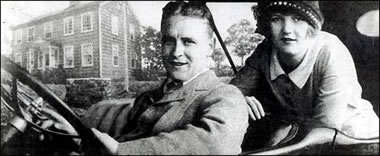
F. Scott Fitzgerald (24 september 1896 - 21 december 1940
Hier met echtgenote Zelda
De Britse schrijfster en filmmaakster Shamim Sarif werd geboren op 24 september 1969 in Londen. Haar familie kwam uit Zuidfafrika en is van Zuid-Aziatische afkomst. Haar wortels inspireerden haar om haar bekroonde debuutroman te schrijven: The World Unseen, Daarin verkende zij de kwesties van ras, gender en seksualiteit, die ze later verwerkte in een film met Lisa Ray, getoond op het London Film Festival in 2007. Ze is de winnares van verschillende prijzen, o.a. voor The World Unseen. Voor de roman ontving zij de Pendleton May First Novel Award en de Betty Trask Award.
Uit: Despite the falling snow
"And yours, how was your work today?" she asks. They walk together to the small sofa and sit down. She likes the warmth of his leg touching hers, feels a stir of desire, but will not, or cannot show it.
"I don't know." His eyes are troubled. "It's not the same since..."
"Since what?"
"You make me look at things in a different way, Katya."
"But I'm proud of you. And your work. Why am I ruining it for you? Because I told you it was your father's path?"
He looks at her for a long time, thinking about the answer. His eyes are still considering when he leans over gently and kisses her throat. She closes her eyes slightly against the pleasurable touch of his lips on her skin, and looking up at her, he catches that moment of release.
"No. Not just that," he continues. "I don't know how to explain. Everything looks new since I met you. It's as though I was sleep-walking through the world up until now. You have sharpened all the blurred pictures that I had in my mind, and now I feel that I see things - or begin to see things - more clearly. I'm not really helping people, Katya. All I can do..."
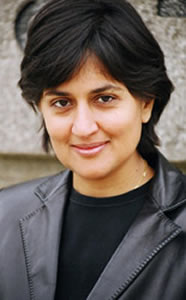
Shamim Sarif (Londen, 24 september 1969)
De Canadese dichter, essayist en schrijver Fernand Ouellette werd geboren in Montreal, Quebec, op 24 septenber 1930. Hij volgde vanaf 1943 klassieke studies aan het College Séraphique de Montreal en behaalde een diploma sociale wetenschappen van de Universite de Montreal in 1952. Vanaf 1955 schreef hij een aantal radio-scripts over Franse en buitenlandse schrijvers voor Radio-Canada. In 1958 werd hij mede-oprichter van het tijdschrift Liberté, en zijn editor-in-chief in 1960. In hetzelfde jaar begon hij met het produceren van culturele programma's voor Radio-Canada, net zolang totdat 1991. Zijn correspondentie met Henry Miller en Pierre Jean Jouve, zijn ontmoeting met Edgard Varèse en zijn reizen in Europa markeren zijn ontwikkeling als schrijver en dichter. Hij won een aantal literaire prijzen.
Ma tristesse
Ma tristesse sabandonne
à la mer, comme une barque
revient de la mort,
bellement nue
après le voyage.
Comment sarracher de linfini
qui me tient aux confins
des ténèbres?
Je tourne parfois sans fin,
comme oublié,
dans le silence de la saison froide.
Tout dérive avec le sang :
le coeur surtout plus noir quun poison.
Et je métonne davoir rêvé,
si près des arbres,
ébloui contre lamante.
Certes la voix parlait bas,
mais pour mieux pointer sa dague.
Ou chantait désespérément
en brûlant les pierres.
La nuit et la lumière
confondaient leurs pouvoirs.
Présence
Puissante la lumière mange
lair du proche horizon,
anime lérable comme un vitrail
bien nuancé de vert.
Lil sexalte, quand
saccroît lillumination de ce qui respire.
(La terre est pourtant profonde,
pour les morts
délaissés dans leur croissance.)
Ce matin, pareil à une masse,
rampait le soleil affaibli des jours désolés,
comme sil buvait un peu à la vasque
du monde :
vaine magnificence, sursaut de célébration,
avant la roue des saisons,
et le silence au ras du sol.
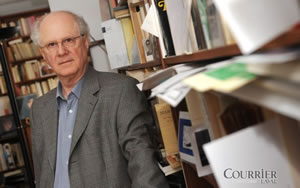
Fernand Ouellette (Montreal, 24 septenber 1930)
De Franse schrijver Yves Navarre werd geboren op 24 september 1940 in Condom. Zie ook mijn blog van 24 september 2008 en ook mijn blog van 24 september 2009.
Uit: Romances sans paroles
L'amitié est purement sensuelle. Elle ne choisit pas son sexe. Elle est la même pour tout le Monde. Elle est tribale, d'une tribu qui n'a ni chef ni totem. Aucune morale, judéo-chrétienne ou freudienne, ne l'a récupérée. L'amour n'est que l'institution du péché originel. L'amitié est l'expression du secret individuel. J'adore rompre en amitié. Parce que la rupture amicale est une adoration. La rupture amoureuse, elle, est une blessure qui ne se referme pas. L'artiste ou l'humain y trouvent leur grain. Spectaculaire. Incident. La rupture amicale s'inscrit, dans une continuité. On devient amis ou amies à la vie et à la vie. Laissons la mort, la mort telle qu'on nous la fait vivre dans les églises ou sur les divans, mêmes chapelles, à la fin des histoires d'amour. Il n'y a pas d'amitié spécifiée sexuellement parce qu'il n'y a pas de milieux sexuels. Les "dits" normaux comme les "dits" anormaux sont partout. Indifférenciés. Il n'y a que certaines questions (racistes ?) pour imposer les principes, faux, d'une différence. Et des réponses (racistes ?) qui emploient les mêmes mots d'un jeu absurde. Et évitable.
[
]
Une trahison amicale ne se pardonne pas. L'amitié n'est pas du territoire des pardons. Elle n'est pas connue. Elle n'est pas dite. Elle n'est pas distribuée aux autres. Elle n'est pas désignée, annoncée. Ou alors, elle n'est plus. L'amitié, ce n'est pas forcément l'aveu. Le "forcément" est amoureux. L'amour dépouille. L'amitié vêt. L'amitié n'aime pas la syntaxe. Elle est la syncope de l'amour. Elle prolifère sans jamais être sue, avouée.
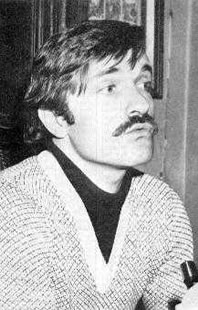
Yves Navarre (24 september 1940 24 januari 1994)
Zie voor nog meer schrijvers van de 24e september ook mijn vorige blog van vandaag.
|



